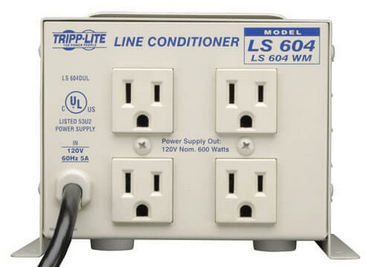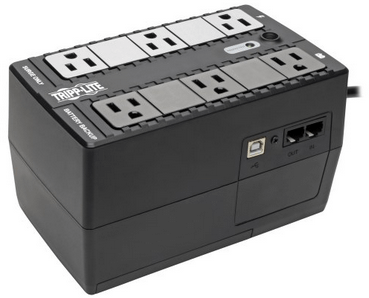The choices for protecting sensitive home and office electronics from power problems can seem overwhelming: surge protectors, line conditioners and uninterruptible power supplies (UPS systems) all have outlets for AC equipment, protect against power surges and may filter line noise to help prevent EMI/RFI interference.
So which do you choose?
Your best choice for power protection depends on your equipment, your risk tolerance, and the quality of your incoming electricity.
- A power line conditioner removes noise and ensures that the voltage is clean and stable.
- A surge protector may prevent a power surge or power spikes from causing damage to sensitive electronic equipment, but it does not alter the flow nor prevent noise and voltage fluctuations from causing other problems, such as interference during audio recording.
- Line conditioners and UPS systems provide additional types of protection not offered by most surge protectors.
Comparison of Surge Protectors, Line Conditioners, and UPS Systems
| Surge Protectors | Line Conditioners | Standby UPS Systems | Line-Interactive & On-Line UPS Systems | |
| Surge Protection | Yes | Yes | Yes | Yes |
| Brownout Protection | Yes | Yes | Yes | |
| EMI/RFI Line Noise Filtering | Yes | Yes | Yes | Yes |
| Voltage Regulation | Yes | Yes | ||
| Battery Backup | Yes | Yes | ||
| Typical Connected Equipment | Computers and Peripherals, Home Theater Electronics | Computers, Laser Printers, Industrial Equipment, Refrigerators, Air Conditioners | Desktop Computers and Peripherals | Servers/Network Equipment |
| Typical Cost (as of 09/2021) | $30 | $200 | $120 | $300-500 |
Modern computer systems integrate an increasing number of noise-producing and noise-sensitive
devices, and load-to-load interference is an increasingly important issue.
When To Use a Power Line Conditioner: For Voltage Regulation, Surge Protection and Line Noise Filtering

An AC power conditioner provides “clean” AC power to sensitive electrical equipment. Usually this is used for home or office or studio environments. A power line conditioner may have 10 or more receptacles (or outlets) and commonly provides surge protection as well as noise filtering.
Some power conditioners provide minimal voltage regulation while others protect against several power quality problems:
- Line conditioners are your best defense against brownouts, which are low-voltage power sags that can cause your equipment’s internal power supply and circuitry to work harder and overheat sensitive components, leading to equipment failure. Areas prone to this are large manufacturing facilities that have noise from heavy machinery
- Line conditioners automatically regulate low and high voltages to provide safe computer-grade power, and some offer surge protection and line noise filtering.
When does a power conditioner add value over a good surge protector?
Line conditioners prevent voltage from surging or reducing in power, meaning that you can have consistent supply of 120 volts per second. Conditioners also protect against storms, lightning strikes, or disruption to the power.
The line conditioner can:
- prevent changes in voltage, making lights dim or brighten,
- stop TV or satellites from shutting off during use,
- and also preserve radio frequency.
What they cannot do is improve the quality of pictures on HD-ready TVs, no matter what kind of HDTV you have. The power control features in the TVs themselves are not affected by line conditioners, so if you are intending to use one to improve your TV resolution, then you will be disappointed.
However, a large enough conditioner will help to protect your television against power surges caused by lightning or electronic discharge.
Surge protectors typically have finite protection capabilities and need to be replaced every few years, and this can make them more expensive in the long run than a more durable line conditioner.
Surge Protectors: Reliable Surge Protection and Line Noise Filtering
Surge protectors are your best defense against daily AC voltage surges and spikes that can ruin your valuable electronics equipment in a flash or cause small voltage spike damage over time. Look at the joule rating when comparing surge protectors – a higher joules rating is better, and a lower clamping voltage is better. Some surge protector models protect phone and data lines, and help prevent EMI/RFI line noise from interfering with equipment performance. But if your budget allows, opt for a whole house surge protector instead of a wall outlet type. Or opt for a power line conditioner.
Surge protectors offer protection for A/V components, network hardware, retail displays, appliances, power tools and other expensive electronics against dangerous surges, spikes and line noise in home, office and industrial environments.
Do Power Conditioners Provide Surge Protection?
Power line conditioners that plug into a wall often include a surge diverter, isolation transformer, and power line noise filter in their design. These power conditioners have better control over surge voltages and thus can prevent system destruction, component degradation, and operation disruption.
Buy a line conditioner with built-in automatic voltage regulation (AVR). AVR regulation offers three levels of voltage stabilization that correct undervoltages and overvoltages back to regulated 120V nominal power. Providing optimum voltage conditions not only extends the life of your equipment, but also keeps your equipment working through brownouts and prolonged overvoltage conditions.
Keep in mind that a power line conditioner is a filter which transmits AC to the power supply of sensitive electrical devices after modifying the power running through it, based on the requirements of the machinery to which it is connected. Power line filters are generally designed as passive filters composed of resistors, capacitors, and inductors, without active components like transistors.
Is a UPS a Power Conditioner?
An Uninterruptible Power Supply (UPS) is a device with a backup battery that provides several minutes of power in the event of a blackout.
A Power Conditioner is a device which filters and distributes power to various types of electronic gear such as studio monitors or audio interfaces, but does not offer battery backup in the event of a power outage.
UPS Systems: Voltage Regulation, Battery Backup, Surge Protection and Line Noise Filtering — Best Choice?
UPS systems are your best defense against downtime due to power outages, and also help prevent electronic damage and data loss.
All UPS systems provide battery backup to keep equipment up and running through short blackouts and brownouts, allowing time to save data and shut down your equipment properly during longer outages. A UPS system can also keep equipment powered during transfer to generator power.
There are three types of UPS systems, each with different features:
- Standby: Provide battery backup, surge protection and line noise filtering.
- Line-Interactive: Provide voltage regulation, battery backup, surge protection and line noise filtering.
- On-Line: Provide the highest level of power protection. Constant on-line operation completely isolates sensitive equipment from every power problem on the AC line.

Communication ports are also a useful feature to have on UPS systems, and some systems can automatically and gracefully shut down computers without losing data during a prolonged power outage if you are not available to properly turn off your devices yourself.
Does a battery back-up UPS also function as a power conditioner?
There are two main types of in-rack network UPS products commonly used in server room applications. Both include some level of built-in power conditioning.
- Line Interactive UPS systems, generally considered the more basic variety, offer built-in battery backup support with automatic voltage regulation (AVR). This type of UPS does register some switchover time of 2-6 milliseconds in response to a power failure. Built-in filter components offer reduced electrical noise for connected equipment. Network UPS models frequently include the option to install a network monitoring card for remote monitoring and control.
- Online, double-conversion UPS systems offer a higher degree of protection by converting incoming AC power to DC, then resynthesize output back to perfectly clean AC output, typically with +/-2 to 3% output voltage regulation, frequency regulation and zero transfer time between AC and battery modes. Online, double-conversion UPS systems are generally considered to offer the best-available protection of network gear. These also support the addition of a network monitoring card for remote monitoring and control.
A UPS will regulate voltage to a degree. If your electricity voltage fluctuates (spikes and drops) to high or low, it could fry a surge protector or a UPS.
Instead of buying one large UPS for your entire system, server, or whatever its purpose, it is prudent to buy 2 or 3 smaller UPS devices. With a few smaller ones if something happens to one at least the whole system is not taken down, and if the remaining UPS devices are loaded half way, it is easy to distribute the load around. Also if you have a server room and your servers have multiple power supplies, plug each power supply on a different UPS, and if only single power supplies are available, use an Automatic Transfer Switch connected to multiple UPSs.
Another item of note is that not all UPS devices are equal. Cheaper ones will output a “modified sinewave” which is harder on some electronic devices to use and looks like a square wave. Better UPS devices will output an actual sinewave or a “pure sinewave”.
Does a good power conditioner need to be replaced any more (or less) frequently than a quality surge protector or UPS?
Every brown-out or power outage creates a spike both when voltage goes down and up. Constant brown-outs and outages wear down the internals including VRM, and the UPS internal filters. Always replace the UPS if your batteries are swelling; this is a sign of internal components wearing out.
As far as surge suppressors go, choose a non-sacrificial unit. Furman, Brickwall, Zerosurge, SurgeX, etc. make units that theoretically will not ever need to be replaced and will retain their ability to prevent a surge.